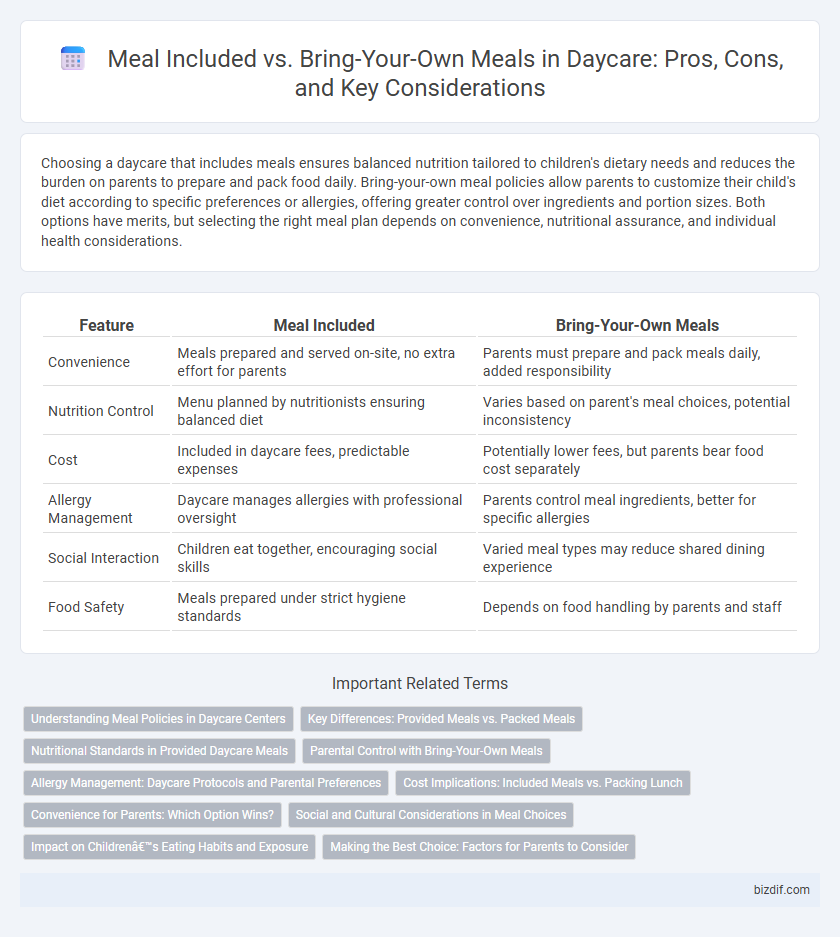Choosing a daycare that includes meals ensures balanced nutrition tailored to children's dietary needs and reduces the burden on parents to prepare and pack food daily. Bring-your-own meal policies allow parents to customize their child's diet according to specific preferences or allergies, offering greater control over ingredients and portion sizes. Both options have merits, but selecting the right meal plan depends on convenience, nutritional assurance, and individual health considerations.
Table of Comparison
| Feature | Meal Included | Bring-Your-Own Meals |
|---|---|---|
| Convenience | Meals prepared and served on-site, no extra effort for parents | Parents must prepare and pack meals daily, added responsibility |
| Nutrition Control | Menu planned by nutritionists ensuring balanced diet | Varies based on parent's meal choices, potential inconsistency |
| Cost | Included in daycare fees, predictable expenses | Potentially lower fees, but parents bear food cost separately |
| Allergy Management | Daycare manages allergies with professional oversight | Parents control meal ingredients, better for specific allergies |
| Social Interaction | Children eat together, encouraging social skills | Varied meal types may reduce shared dining experience |
| Food Safety | Meals prepared under strict hygiene standards | Depends on food handling by parents and staff |
Understanding Meal Policies in Daycare Centers
Daycare centers have varying meal policies, with some providing nutritious meals as part of the daily fee while others require parents to bring their own food. Understanding these policies ensures children receive balanced nutrition and helps parents prepare appropriately for their child's dietary needs. Clear communication with the daycare about meal options, allergies, and preferences is essential for maintaining health and safety standards.
Key Differences: Provided Meals vs. Packed Meals
Daycare centers offering provided meals ensure balanced nutrition tailored to children's dietary needs, adhering to health and safety regulations, while packed meals rely on parents to supply food, which may vary in nutritional quality and portion sizes. Provided meals simplify daily routines for parents and staff, reducing concerns about allergies and food preferences through standardized menus. Packed meals offer customization but require careful planning to meet nutritional standards and avoid food safety risks during storage and consumption.
Nutritional Standards in Provided Daycare Meals
Daycare centers offering meal inclusion adhere to strict nutritional standards set by national health guidelines, ensuring balanced portions of fruits, vegetables, proteins, and whole grains tailored to children's developmental needs. These meals are regularly reviewed by registered dietitians to optimize nutrient intake and support healthy growth, reducing risks of childhood obesity and nutrient deficiencies. In contrast, bring-your-own meals often lack consistent nutritional oversight, increasing the variability of children's dietary quality and potentially impacting their overall health outcomes.
Parental Control with Bring-Your-Own Meals
Bring-your-own meals provide parents greater control over their child's nutrition, allowing them to meet specific dietary needs and preferences. This approach ensures ingredients are trusted and allergen-free, reducing health risks. Parental oversight in meal preparation and selection fosters enhanced dietary management in daycare settings.
Allergy Management: Daycare Protocols and Parental Preferences
Daycare centers implement strict allergy management protocols when meals are included, ensuring cross-contamination prevention and ingredient transparency for children with food allergies. Parental preferences often lean towards bringing their own meals to maintain control over allergens and provide comfort in dietary consistency. Effective communication between caregivers and parents is essential to customize meal plans that prioritize children's health and safety in any setting.
Cost Implications: Included Meals vs. Packing Lunch
Daycare centers offering included meals often factor these costs into tuition fees, providing convenience and balanced nutrition under professional standards. Packing lunch can reduce upfront daycare expenses but may increase daily preparation time and risk nutritional inconsistency. Families must weigh the financial trade-offs and nutritional priorities when choosing between included meals and bringing their own.
Convenience for Parents: Which Option Wins?
Meal-included daycare programs offer unmatched convenience for parents by eliminating the need to pack daily lunches, saving time during busy mornings and ensuring children receive balanced, nutritious meals prepared by professionals. Bring-your-own meal options provide flexibility for families with specific dietary preferences or restrictions but require parents to plan and prepare food, potentially adding to daily stress. Overall, meal-included plans streamline routines and reduce logistical burdens, making them the preferred choice for convenience-conscious parents.
Social and Cultural Considerations in Meal Choices
Daycares offering meal inclusion foster social interaction by encouraging children to share diverse cultural foods, enhancing mutual understanding and acceptance among peers. Bringing own meals respects individual dietary restrictions and cultural preferences, promoting inclusivity and personalized nutrition. Both approaches require sensitivity to cultural values and dietary needs to support children's social development and cultural identity.
Impact on Children’s Eating Habits and Exposure
Meal included daycare programs positively influence children's eating habits by providing balanced, nutritious meals that introduce a variety of fruits, vegetables, and whole grains, promoting healthy dietary patterns. In contrast, bring-your-own-meals policies may limit exposure to diverse foods due to varying parental choices, potentially reinforcing picky eating or limited food preferences. Consistent exposure to well-planned meals in daycare settings supports better long-term food acceptance and nutritional awareness among children.
Making the Best Choice: Factors for Parents to Consider
Choosing between daycare meal plans and bring-your-own meals involves evaluating nutrition quality, convenience, and dietary preferences. Daycare-provided meals often follow strict nutritional guidelines and reduce preparation time for parents. Bringing meals allows customization for allergies and cultural dietary needs but requires extra effort and proper storage.
Meal included vs bring-your-own meals Infographic

 bizdif.com
bizdif.com